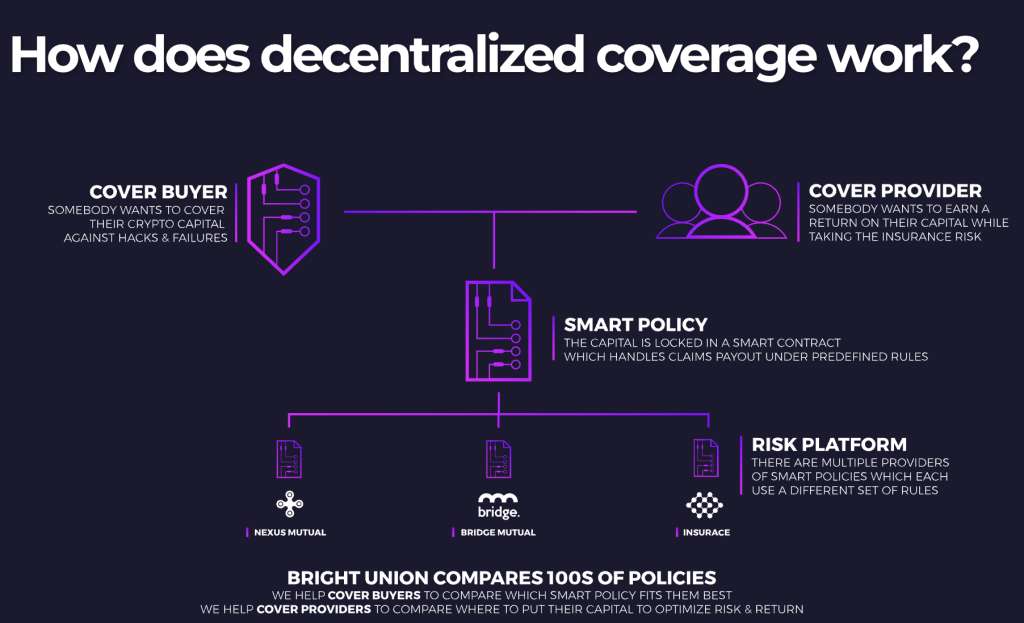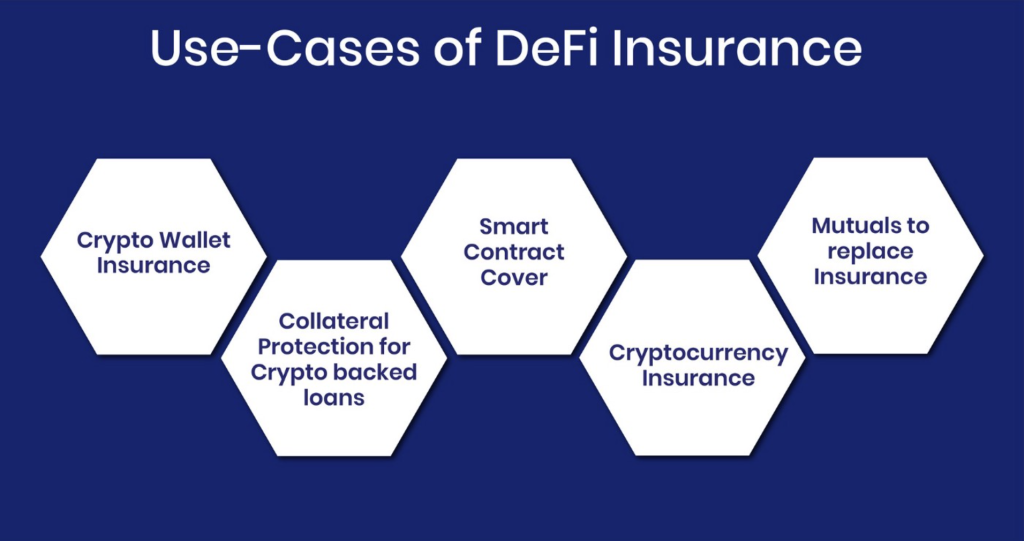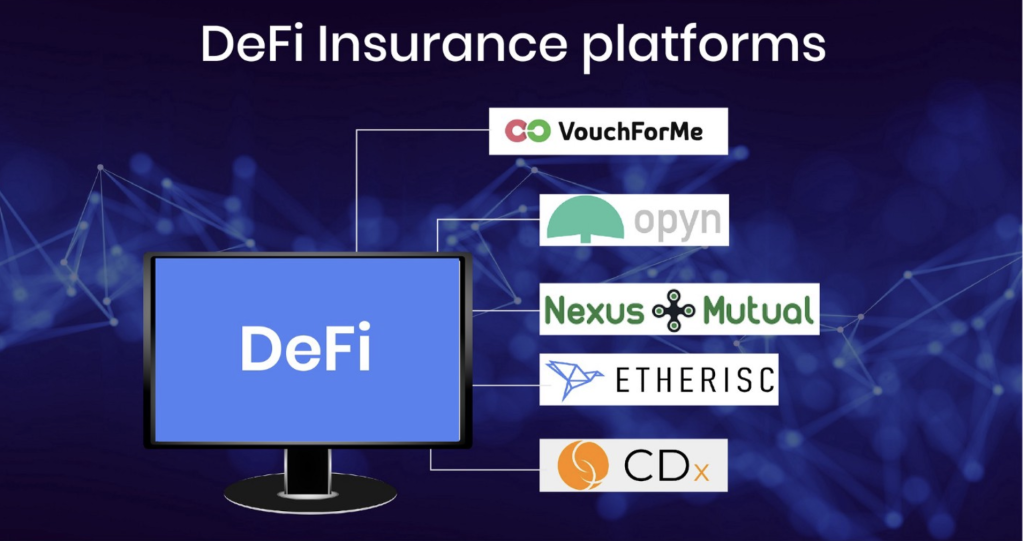Find, Compare And Select DeFi Insurance
Decentralized Insurance products offer complete protection for DeFi deposits, hedge crypto volatility and flash crashes, as well as ensure the security of crypto wallets against theft and attack. Learn how Decentralized Insurance can leverage Blockchain technology to protect your crypto assets and cover risks.
Decentralized Insurance — a promising sector for DeFi
Decentralized insurance is a promising sector due to the transparency and security it provides to investors. Currently there are only a couple of products available but it certainly has the potential to grow and expand in the future. DeFi and its applications like Decentralized Finance will continue to rule the market for years to come.
Traditional assets have been commonly protected through the use of insurance, which would soften the blow should something happen to that individual’s investment. There are now multiple options for insurance, specific to the DeFi ecosystem and projects contained in that ecosystem. Currently, only 2% of DeFi holdings are insured, which is a dangerously low amount considering the prevalence of scams, hacks, and technical failures. There is now a range of DeFi insurance projects.
It is likely that as more people enter the DeFi market and become exposed to the benefits of having DeFi insurance, we will see more people coming towards these products as a means of protecting their investment.
What is DeFi insurance?
Similar to traditional insurance, DeFi insurance protects crypto holders against risks in return for premiums. Instead of being governed by an insurer, premiums and payouts are decentrally determined. By providing capital to a risk pool, you can earn the insurance fees by being exposed to risk.
Cover protocols entering this insurance market are making the developing DeFi space a safer place to navigate, lowering entry barriers for both newcomers and institutions.
How does decentralized insurance work?

Use-Cases of Decentralized Insurance

Over a couple of years, there have been innumerable cases of smart-contracts hacking, cyber attacks on exchange platforms etc that have caused huge loss of investor funds. Even the magnanimous DAO could not prevent a malware attack on its platform that resulted in loss of billions. Decentralized Insurance has plenty of use-cases that can help prevent such consequences from occurring.
Crypto Wallet Insurance
Companies like Etherisc have developed solutions to cover the risk of theft of crypto wallets in case of attacks. In the survey that Etherisc conducted to understand the need for decentralized insurance, the majority of users agreed that there was a need for wallets to be insured but there were fewer options available in the market for the same. Thus, by understanding that there indeed was a need for crypto wallet insurance solutions, Etherisc provides crypto wallet insurance covering a large sum. This is a great use-case of decentralized finance.
Collateral Protection for Crypto backed loans
In a typical case of Crypto loans, if the collateral provided by the borrower is destroyed or stolen, then the loan is paid off by the insurance policy. Etherisc, along with several other companies like Sweetbridge, Celsius, Nexo, Libra Credit and a few others established a consortium that safeguard and secure collateralized crypto-backed loans, an amazing application of decentralized insurance. Says Mac McGary, President of the Sweetbridge Alliance,
“In today’s volatile market, Collateral Protection Insurance provides borrowers and lenders with a sense of security from crypto lending networks, which is a critical step in advancing blockchain adoption.”
Smart Contract Cover
In this amazing decentralized insurance product called the Smart Contract Cover, the insurance covers the loss if the designated smart contract address is hacked and is used for manipulation such as loss of funds from the investor account, or if funds are moved to another address which doesn’t belong to the original investor. It also covers loss where the funds are permanently lost and cannot be recovered anymore. Thus, investors and lenders can lend crypto loans on the exchange without worrying much about repayment or losses. Nexus Mutual is one such company that has developed the Smart Contract cover.
Benefits of Decentralized Insurance

Decentralized Insurance products offer complete protection of DeFi deposits, hedge risk
against crypto volatility and flash crash as well as provide security against the risk of theft and attack on crypto wallets.
They secure users against any possible DeFi risk, cover technical and financial risks, thus building a sense of safety amongst investors.
The platforms also make the entire process of submitting, claiming and processing and payouts extremely safe, reliable and transparent.
1) Protection of DeFi deposits
2) Protection against crypto volatility and flash crash
3) Immediate redemption of tokenized crypto
4) Protection against the risk of theft and attack on crypto wallets
5) Protection of funds from hacks on exchange platforms
6) Covers technical and financial risks
7) Immediate claim payouts
8) Trustless claim and risk assessment
Decentralized Insurance Platforms

Nexus
Currently, the most popular insurance is from first-mover Nexus Mutual, an Ethereum-based insurance provider. With more than $100 million active cover amount, the Curve cover is the favorite, enabling users to swap stable coins securely. Nexus Mutual’s capital pool has experienced steady growth over the past year, and its governance token is finally closing down on the top 100 cryptocurrencies. Since its launch, Nexus Mutual has accumulated a total of $400 million in total covers protecting users against a range of risks.
Smart contract failures and exchange hacks are two of the most common causes for loss within the DeFi sector, which is why Nexus provides cover for these eventualities. The project is run through and on the behalf of its community. Decisions for the project are recorded on the blockchain and they are then put into practice by the use of smart contract technology.
Nexus has attracted a decent amount of exposure in the DeFi insurance market and they have plans to branch into other lines of insurance products too. This can be crypto wallet insurance or even your standard, non-crypto insurance products like earthquake insurance.
InsurAce.io
InsurAce, one of the more emergent players, has been stealing the show recently, despite only launching in May last year. The platform’s unique multi-chain architecture gives users the ability to select between the BSC, Polygon, and Avalanche next to the Ethereum blockchain, tackling the high gas fees attached to the Ethereum network.

InsurAce Protocol has consistently doubled its active cover amount every two months since its mainnet launch in May 2021. (Insurace.io)
Terra’s savings protocol, Anchor, is currently the most popular InsurAce cover, amounting to $7.3 million in active covers. Anchor investors cover against unlikely adversity while receiving an impressive 20% APY on Tether (USDT) lending. Moving towards coverage for multi-chain networks will improve accessibility and broaden the market for DeFi coverage on protocols beyond Ethereum.
They have also received professional backing from a range of institutions including Defiance Capital, Huobi Labs and several more. This has allowed InsurAce.io to provide protection for a range of other DeFi projects, including but not limited to AAVE, Compound and Anchor.
InsurAce.io is able to offer prices much lower than other insurance protocols, sometimes as much as 60% cheaper. This is due to their portfolio-based insurance which lets the user insure their combined assets together. Their offering gives investors peace of mind when operating in DeFi.
As of now they actively offer covers for Centralized Exchange Risks, IDO Event Risks and Smart Contract Vulnerability. There are also plans to include dPeg and wallet insurance in the future, as well as an upcoming API that will allow for 0-click insurance integration with DeFi protocols.
Bridge Mutual
Bridge Mutual, another insurance protocol, allows insurer users the unique capability of providing coverage by staking stablecoins, adding an extra layer of safety.
Derivatives protocols Alpha and Barn Bridge are among the most popular cover options here. These two protocols enable users to hedge against price instability or use leverage to increase exposure further. The Alpha Homora product lets DeFi users leverage their yield farming portfolios up to 2.5 times. Risky behavior simply attracts insurance protection. Just like how most wingsuit flyers choose the best insurance, crypto coverage can act as a useful safety net when opening leveraged positions.
Bridge Mutual has a versatile offering of insurance products related to the crypto market. Furthermore, users do not have to worry about unscrupulous insurance companies and unfair denial of a claim. This is because claims go through a two-stage verification and voting process to ensure they are worthy.
This also protects the insurance funds, making sure they aren’t spent needlessly. The project currently has plans to explore other blockchains, which remain to be seen. People are also able to stake on the platform, which will earn them a variety of rewards.
Cover
Cover is a DeFi project that is attempting to make insurance a more community-focused and serving venture. The insurance marketplace on this platform follows a peer-to-peer model, which causes prices to be impacted by supply and demand. This creates a flexible market. Users of this project are also able to use these services without actually giving up their identity to Cover. This can be an attractive option for those that are anxious about handing over personal information on the internet.
Decisions on the outcome of insurance claims from Cover are made by a community board, which is made up of prominent figures in that particular ecosystem.
Nsure
Nsure is the project name behind a DeFi protocol that operates an open insurance platform that is not exclusive to the crypto market. This marketplace allows individuals to trade for the values of certain risks. What you find in a system where rights to these risks are tradable, the powers of the market and supply/demand calculations will have a massive impact on the final pricing of coverage.
By putting money or assets into the project, people are able to get NSURE tokens, which are the native tokens used on the platform. Buying insurance plans with Nsure is also another way to accrue these tokens. This rewards the user for not only buying into the project but also for using its primary function.
Aggregating Crypto Coverage
Growing demand for coverage emphasizes the call for comprehensive DeFi coverage solutions. Positioned as the 1inch for risk coverage products, Bright Union is making sense of crypto market risks. By partnering with leading coverage protocols, Bright Union provides an integrated service that improves access and simplifies risk management for a range of users.
As a risk aggregator, Bright Union makes coverage transparent and easy, and adds value, driving the market forward. Users can find, compare and select covers from all over the industry, from a simplified interface. DeFi funds enjoy portfolio-based insurance products, while protocols and wallets can easily integrate the DeFi insurance landscape by integrating the Bright SDK.
Bright Union offers the lowest cover price
The possibilities for users, developers and investors in the DeFi space are endless, although accompanied by inherent risks. As demand for DeFi expands, many are reluctant due to lack of regulation, protocol failures and hacks. Coverage takes down the threshold for new users. Investors now have the potential to fearlessly benefit from what the space offers.
Together with current partners Nexus Mutual, InsurAce, and Bridge Mutual, Bright Union is aggregating 150+ coverage solutions and accelerating adoption, making safely navigating DeFi accessible for the community of users.
Besides the enormous range, Bright Union also sells the cheapest DeFi covers in the market, due to the multi-chain infrastructure and a cashback program in collaboration with InsurAce.
Find those suitable covers to protect your digital asset portfolio on app.brightunion.io.

Bright Union offers the cheapest DeFi covers in the market. Source: app.brightunion.io.
“With $1 Billion lost, hacks and exploits are among the biggest problems in DeFi. We believe that, just like insurance in the real world, DeFi insurance will grow exponentially and we are looking to play a pivotal role in achieving mass adoption, facilitating the crypto community safe navigation through the DeFi space.” – Jorrit Kooi, CEO Bright Union
Sources:


